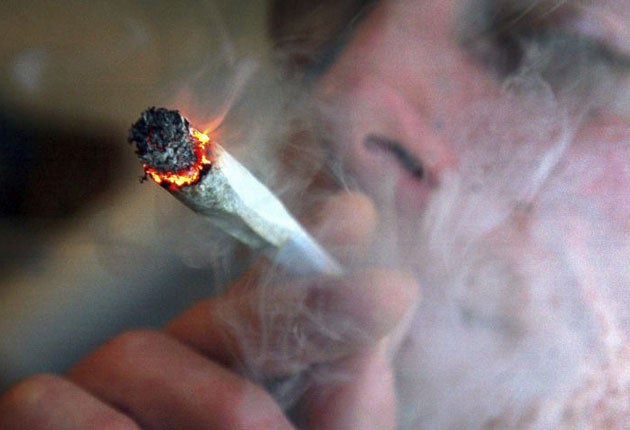Your support helps us to tell the story
From reproductive rights to climate change to Big Tech, The Independent is on the ground when the story is developing. Whether it's investigating the financials of Elon Musk's pro-Trump PAC or producing our latest documentary, 'The A Word', which shines a light on the American women fighting for reproductive rights, we know how important it is to parse out the facts from the messaging.
At such a critical moment in US history, we need reporters on the ground. Your donation allows us to keep sending journalists to speak to both sides of the story.
The Independent is trusted by Americans across the entire political spectrum. And unlike many other quality news outlets, we choose not to lock Americans out of our reporting and analysis with paywalls. We believe quality journalism should be available to everyone, paid for by those who can afford it.
Your support makes all the difference.Colorado and Washington have become the first US states to legalise the possession and sale of marijuana for recreational use.
The legalisation will set the stage for a possible showdown with newly re-elected President Barack Obama as the states’ initiative is in defiance of the US Department for Justice’s federal laws which consider marijuana an illegal narcotic.
Supporters of Colorado’s constitutional amendment were the first to declare victory after returns showed 53 per cent voted in favour.
And supporters of Washington State’s legalisation initiative declared victory after the Seattle Times and other media projected a win for marijuana proponents.
But another ballot measure to remove criminal penalties was defeated in Oregon, where significantly less money was devoted to campaigning.
Mason Tvert, co-director of the Colorado pro-legalization campaign said: “Colorado will no longer have laws that steer people toward using alcohol, and adults will be free to use marijuana instead if that is what they prefer. And we will be better off as a society because of it.”
The Drug Policy Alliance, a national advocacy group that backed the initiatives, said the outcome in Washington and Colorado reflected growing national support for liberalised marijuana laws.
Citing a Gallup poll last year, the DPA said a 50 per cent of Americans favoured making marijuana legal, versus 46 per cent opposed and 4 per cent undecided.
Colorado and Washington have already legalised marijuana for medical purposes, but full legalisation is sure to put them in further conflict with the federal government.
The US Department of Justice initially reacted Colorado’s declaration by saying its enforcement policies remain unchanged, adding: ”We are reviewing the ballot initiative and have no additional comment at this time.“
In addition to Colorado and Washington’s full legalisation, measures to legalise marijuana for medical use are thought to have passed three states, including Massachusetts.
Seventeen other states, plus the District of Columbia, have already legalised medical marijuana use.
Under the measures in Colorado and Washington, personal possession of up to an ounce of marijuana would be legal for anyone over 21 years of age.
Cannabis could also legally be sold and taxed at state-licensed shops in a system based on that used for alcohol consumption.
In Colorado the cultivation of up to six marijuana plants will also be legal, although ‘grow-your-own’ will still be illegal in Washington state.
Oregon's failed initiative would have gone a step further and also legalised the cultivation of unlimited amounts of marijuana for personal recreational use.
Tvert said provisions legalising simple possession in Colorado would take effect after 30 days, once the election results are certified.
Colorado's amendment also mandates establishing rules for sales and excise tax collections once the state legislature reconvenes in January.
In a statement, Colorado Governor John Hickenlooper said: ”The voters have spoken and we have to respect their will…This will be a complicated process, but we intend to follow through.“
He added: ”Federal law still says marijuana is an illegal drug, so don't break out the Cheetos or gold fish too quickly.“
Critics say the social harms of legalizing marijuana - from anticipated declines in economic productivity to a rise in traffic and workplace accidents – outweigh any benefits.
The pro-movement, however, points to potential tax revenues and argue that marijuana prohibition has accomplished little.

Join our commenting forum
Join thought-provoking conversations, follow other Independent readers and see their replies
Comments